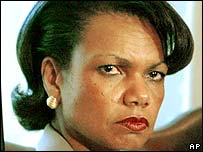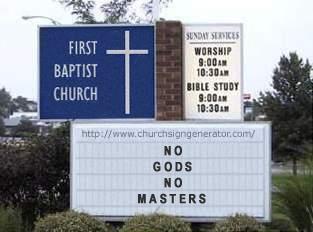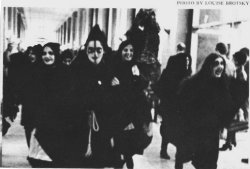Condoleezza’s Right

Here’s something that you may have thought you’d never see in the pages of the Rad Geek People’s Daily: Condoleezza Rice is absolutely right.
Over at Stone Court (thanks again, Feminist Blogs!), Fred Vincy’s pointed out Condoleezza Rice’s stance on gun control, offered up by The Times (2004-11-21):
Violence was turning her hometown into
Bombinghamas Alabama’s governor George Wallace fought a federal court order to integrate the city’s schools. The Ku Klux Klan bombed the homes of blacks who were beginning to move into white neighbourhoods. Among the targets was the home of Arthur Shores, a veteran civil rights lawyer and friend of the Rices. Condi and her parents took food and clothes over to his family.With the bombings came marauding groups of armed white vigilantes called
nightriderswho drove through black neighbourhoods shooting and starting fires. John Rice and his neighbours guarded the streets at night with shotguns.The memory of her father out on patrol lies behind Rice’s opposition to gun control today. Had those guns been registered, she argues, Bull Connor would have had a legal right to take them away, thereby removing one of the black community’s only means of defence.
I have a sort of pure second amendment view of the right to bear arms,she said in 2001.
Condi’s experience wasn’t out of the ordinary. During the hardest fights of the civil rights movement in Mississippi and Alabama, ordinary Black families and civil rights activists defended themselves against the Klan terror by arming themselves. (Yes, organizers who were passionately committed to the principles nonviolent civil disobedience did too–nonviolent demonstrations don’t mean letting the night-riders burn or bomb your house. When they asked Fannie Lou Hamer why her house in Sunflower County never was dynamited, her answer was I keep a shotgun in every corner of my bedroom.
)
And I think they were right to do so. So I can’t agree with Fred when he objects:
My initial, flip reaction, was — well, that’s not the lesson I would have drawn. Vigilantes make a practice of driving through your neighborhood
shooting, and you conclude that making guns more available is a good thing?
Yes, it is–because the night riders wouldn’t have any trouble getting guns even with stringent gun control laws. Stricter gun control in Bombingham would have only meant fewer Black families able to defend themselves against the night riders. And what would they have done? Called the cops? Bull Connor’s cops? Condi is right to point out that what gun control means is that somebody in the government–usually the sheriff or the police commissioner–has the power to decide who can arm himself or herself and who can’t. It means that the government prohibits some substantial portion of the population from buying the weapons that they can use to defend themselves, in the expectation that they will depend on the Authorities for the protection of their lives. But for a Black woman in Bull Connor’s Birmingham, depending on the Authorities to defend your life was a sucker’s bet. Depending on Bull Connor to keep guns out of the hands of dangerous white supremacist terrorists was a sucker’s bet. And the fact is that, for all the progress we’ve made, it’s still far from clear that relying on the cops is a good bet for Black people–or for that matter, for women, for Muslims, for any number of people who have historically had the boots on their necks (see, for example, GT 2004-11-14, GT 2002-02-13, GT 2001-10-25, GT 2001-04-21, and GT 2001-04-04).
You might be inclined to say: look, Jim Crow is over; things got better, and they still can get better. (I think this is the take that Fred’s suggesting when he says for Rice, the deeper lesson of growing up in Birmingham in the early 60s was that government is fundamentally corrupt and untrustworthy
.) Yes, gun control now wouldn’t be as bad as it would have been in Bull Connor’s day. But it will still be bad. The answer is not to throw the wankers out and find the right people to head up the gun control regime in their place. There’s a strong historical argument against that suggestion: the first gun control legislation in American history were laws to ban free blacks from owning guns in the South; later efforts were driven by fear-mongering against the alleged criminal (or revolutionary) tendencies of labor leaders, Slavic and Italian immigrants, and urban Blacks. And I can’t see any good reason to set the history of gun control aside when we consider what it means for real people in the present world.
Even setting the historical arguments, though, I still can’t find a good reason to trust the right people
to manage a gun control regime. In fact, I’d argue that there aren’t any right people to find: the power to disarm a whole class of people is inevitably a corrosive power. There is no way to do it without creating a class of people who are completely dependent on the ruling class and their agents for the defense of their very lives and livelihoods: that’s what gun control means. As Leftists–opponents of unjust and arbitrary power–it should be very troubling to those of us on the Left when the powerful have all the weapons and the people over whom they have power have none to defend themselves. That’s absolute power, and absolute power corrupts absolutely. You see it today in the professional paramilitary police forces that occupy most major cities today; and it’s important to see how it’s a power that can’t help but corrupt any class that seizes it.
Écrasez l’inf?@c3;a2;me.



